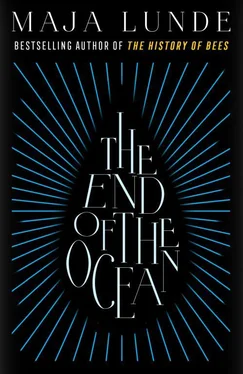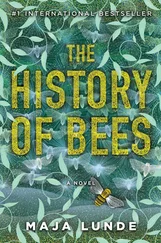I didn’t turn around to look back. Didn’t look anymore at the scorched ground, the sleeping people who would soon wake up to the drought—the drought and the flames they had fled from, but which had now caught up with them.
I moved slowly, with my backpack on my back and Lou in my arms. All of this was too much to carry, too heavy, but at the same time, too light.
I stopped from time to time but never sat down. Just stood there, motionless, breathing, waiting, and then continued walking when I felt I was up to it.
I stopped at every single farm we passed, put Lou down in the shade, and searched. Found food in a couple of places, but water in only one place, in an almost empty tank. I filled up some battered plastic bottles and put them in the knapsack.
My load grew even heavier, but I could take it.
Lou awoke from time to time. She didn’t say anything; she blinked, but never focused her gaze on me.
*
The boat was waiting for us, in the middle of the canal, safe and sound in its cradle. The ladder was leaning against the stern, as if it were welcoming us.
We can stay here, I thought. We can boil the muddy water at the bottom of the water tank. It must be drinkable if we boil and filter it.
We can stay here, Lou and I. We can play. We can play so much, play so hard that everything else disappears.
I can play like that. It’s perhaps the only thing I know how to do.
I put Lou down on the ground by the boat and shook her gently.
“Lou? Lou… You have to wake up, I can’t carry you up.”
Finally she came around. Got to her feet and waited, swaying. I put my arms around her. I wanted to hug it away, the entire night, the flames and Francis, who had carried her out.
But she didn’t respond to my hug, she was completely stiff. Finally I released her. She continued to stand in the same position, staring at me.
“We must go to the camp,” she said.
I didn’t answer. She was thinking of August, of Anna. Of how they might come.
“We have to go back now,” she said.
“Are you thirsty? I have water. Here.”
“I’m not thirsty.”
“We will find Mommy and August,” I said. “We just have to rest a little. Stay here for a little while.”
“No.”
“Do you want to sleep some more? You can sleep in the boat.”
“We have to see how the others are doing.”
“The others?”
“Marguerite. And Francis. And everyone.” Her quiet voice was full of stubbornness. “We have to go now, Daddy. We have to go.” She turned and took a few steps. Her steps were heavy and her neck determined as she walked across the muddy bed of the canal, up onto the bank.
“Lou?”
“We have to go there, Daddy.”
And she started walking more quickly on the cart road between the trees.
“Lou, no.”
I hurried after her.
“I’m going back,” she said.
“We can’t.”
“Can to!”
I pulled her close to me, wanting to hold her tight, but she twisted out of my grasp.
Such strength—I had no idea she was so strong, so tough.
I took hold of her again. But she struggled against me, she scratched, screamed and bit. At first without a word. Only a low hissing, fierce whimpers and moans accompanied her exertions.
But then the words began. Everything she was carrying. A lot of it I had heard before, but some words were new. Idiot! Shit father! Damn Daddy!
I restrained her by force, the force of a father, hating it, that I had to hold her like this. I’d never held her like this before. If a father holds his child like this, does it constitute abuse? Does it?
I held on to her, tighter and tighter. She screamed, louder and louder. Finally it came:
“I hate you. I wish you were dead. Just like August! Just like Mommy!”
It was only then that I released her.
I released her so abruptly that she fell down. Her body hit the ground with a thump.
And there she remained, breathing hard where she sat. Her hair hung over her eyes. I couldn’t see her face, and I wondered if she was crying, but she wasn’t sobbing. Only breathing, more and more slowly.
I could have screamed, too. Yelled back at her. Denied it. Objected. Put her in her place. Called it delusions.
Or comforted her. Said that you mustn’t think like that. Given her hope.
But I didn’t say anything. Because there wasn’t anything more to say. She’d said it all.
Finally she got to her feet. Turned away from me. Started walking again.
But she didn’t walk far. Because she knew I wasn’t following her.
She just walked a few steps into the forest, to a spot in the shade.
There she sat down, folding her legs underneath her.
“Lou?”
“Go away. Go to the shitty boat.”
And I turned away. Did as she said. Because she wouldn’t leave me, no matter what I did. She was a child, she couldn’t leave me. Hiding here between the trees for a little while was the extent of her daring. And that in itself, that I could rest assured that she wouldn’t leave me, was almost the worst part. The most unfair thing of all.
I climbed up onto the boat. Crawled into the forepeak.
When I opened the ceiling hatch, a breeze swept over me. A slight draft.
I lay down on the berth, feeling the woolen fabric in the mattress prickling against my skin.
And then I cried.
Then I cried.
I cried for everything I’d had.
The cramped apartment by the wharf. The rooms that were sticky in the heat. The tiny kitchen with clutter in all the cupboards. The sofa bed we argued on, made love on.
Mommy, Daddy, Alice.
Anna, her eyes, her mouth laughing, yelling. I cried for her body, the hollow in her neck, her breasts, everything I wanted to bury myself in.
I cried over August, God, how I cried for him. Our baby, the gurgling sounds he made, which nobody else managed to imitate. The porridge he spit out, how he laughed while spitting. His tummy, the belly button bulging against the world. Even his diapers, I cried for his diapers, which I hated changing.
And I cried about myself. My bungling. My voice that was too loud. That I always came home too late after a night on the town. I cried about the time I’d forgotten to pick up Lou from the babysitter’s. About the key hook I never put up in the hallway. About being the kind of person who was unable to pull out in time.
I cried over what had been a life, over how it had been taken away from me.
And while I was crying, it was no longer possible to keep that day at a distance. The day Anna and August disappeared.
*
Anna had wanted us to leave. She talked about it every day. Almost nobody we knew was still in Argelès. She wanted to go north, showed me photos of the camp near Timbaut. We’ll be safe there, she said, we can travel on from there.
The streets were empty. The stores closed. We had hoarded, but the food would soon come to an end.
But I couldn’t bring myself to leave. We had an additional responsibility, those of us who worked at the plant. That’s what we told each other, that’s what I told her.
And we had water, as much as we needed. As long as we had water, we could manage.
All the same, more people left, also those who worked at the plant. Finally, only Thomas, my boss, and I remained.
The electricity came and went, cut off for increasingly long periods of time. And without electricity, no production.
Thomas laughed about it, about how well we had messed things up for ourselves, we humans. It was the electricity production from coal-fired power plants that had contributed to creating global warming and the water shortage in the first place, and now we needed even more electricity to produce water.
Читать дальше










